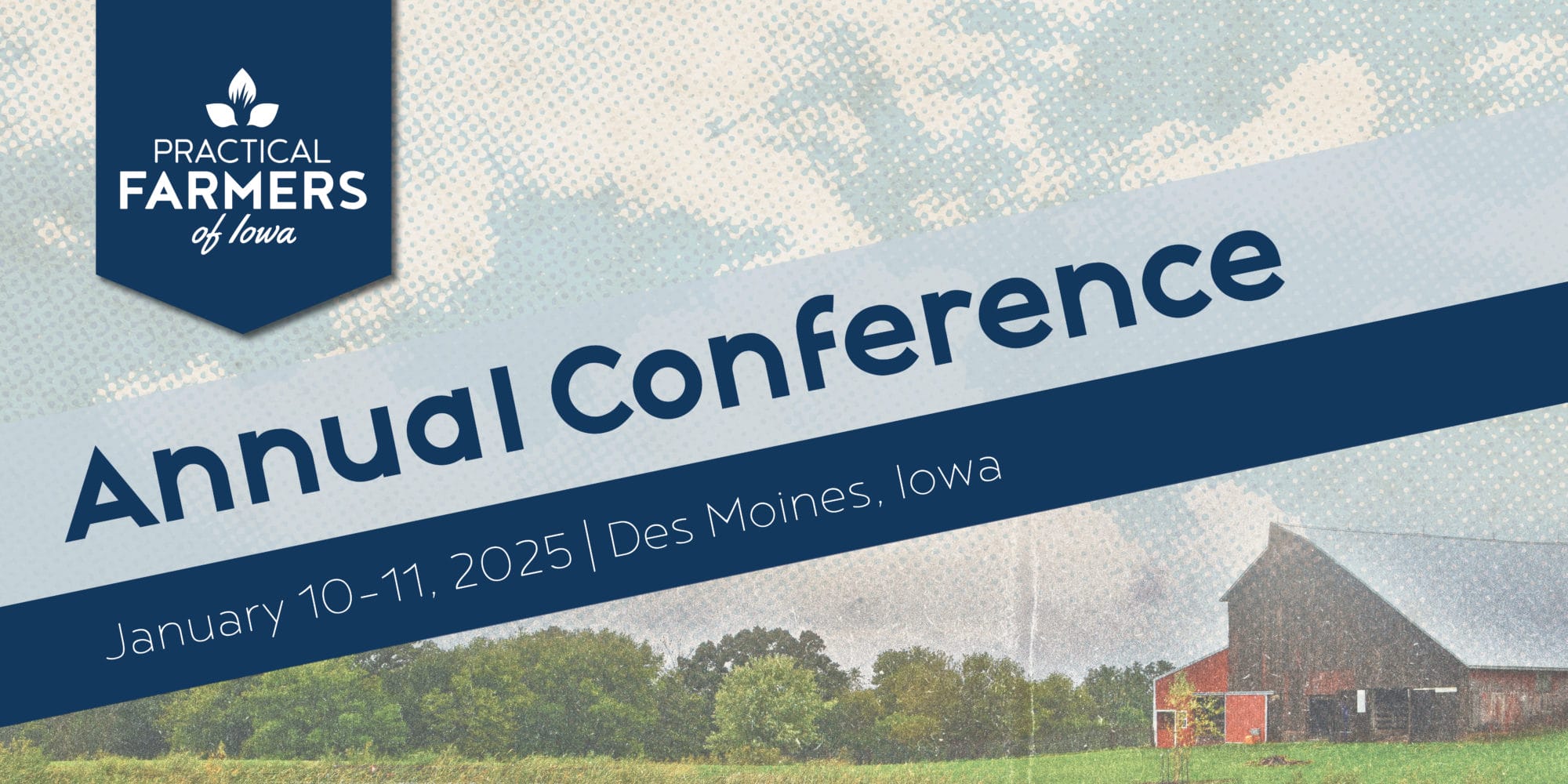Short Courses
Thursday, Jan. 9 | 1:30-6 p.m.
Friday, Jan. 10 | 8-11 a.m.
Ahead of the official conference festivities, we are pleased to offer three “short courses.” Short courses are in-depth explorations of a specific topic that our members have expressed interest in learning more about. Running Thursday afternoon and Friday morning, a short course is a unique opportunity to expand your conference learning experience and gain more detailed knowledge about topics that interest you.
Because space is often limited for short courses, pre-registration is strongly encouraged, and short course attendance is charged per person.
Short Course Pricing:
Walk-in Registration Available (as space allows):
- PFI Members: $60/person
- Non-PFI Members: $100/person
Short Courses:
Short Course 1: Charting the Steps of Farm Succession
Short Course 2: Extending the Rotation: Finding an Effective Third Crop
Short Course 3: Strawberry Production in Iowa
Short Course 1: Charting the Steps of Farm Succession
What will your farm look like 30 years from now? Statistically speaking, Iowa is on the cusp a huge transfer of land from one generation to the next. This course is designed to address the various steps of a farm succession process. We will explain in plain language how trusts, wills and business structures (such as LLCs) may all be part of a farmer’s succession plan. We’ll also provide time to clarify your vision for the future, goals for the succession and strategies for maintaining relationships and talking with stakeholders who may or may not share your goals.
This course is designed for any farmer or non-operating landowner, whether you are considering selling to your tenant, gifting to a nonprofit, negotiating with siblings or farming with the next generation. You will leave this course with your next steps and resources to take action.
Short Course Sessions
Session 1:Taking Stock: Understanding What You Want for the Future of Your Farm
Speaker: Martha McFarland
Getting started with farm transition requires assessing what you’ll be selling or passing along to the next generation. In this session, we’ll discuss your farm’s past, your current operation and the reasons why you’re taking steps now to plan out the future of your farm. You’ll also start thinking about what’s really important to you along the way.
Session 2: Legal Tools for Farm Transition Part 1
Speaker: Rachel Armstrong
Legal tools like trusts, wills and business structures (LLCs) can all be a part of a farmer’s succession plan. Listen as Rachel Armstrong, executive director of Farm Commons, defines each tool, its relevance to your farm transition and provides some clarity on what tool to use when.
Session 3: Legal Tools for Farm Transition Part 2
Speaker: Rachel Armstrong
Rachel Armstrong will continue to define the role of attorneys and other professionals involved in farm transition. She will also discuss their role in helping you create solid plans, and how gifting and buy-protect-sell programs can play a role in creating affordability for incoming farmers.
Session 4: Setting Goals for the Future of Your Farm
Speaker: Martha McFarland
In this session, we’ll focus on specifics related to the future of your farm. We’ll cover how to assess your needs for the future, your retirement goals and how to think about what’s most important to you. By identifying goals for your farm’s future and for the transfer of assets, you’ll leave with a personalized farm transition plan to put in motion and help you make decisions.
Session 5: Q&A With a Panel of Service Providers
Speakers: Rachel Armstrong, Ed Cox, Kristine Tidgren, Matt Roberts
After learning about the legal tools used in farm transitions and creating an outline of a plan with goals and next steps, you probably have some questions. This session will give you a chance to hear from experts in the field about what might or might not work for you.
Session 6: Communication and Next Steps
Speaker: Martha McFarland
You can go to a lawyer to get legal advice, and an accountant to understand tax implications of a farm transition. But how do you communicate what’s important to you and maintain relationships with stakeholders? The answer might be easier than you think.
Session 7: Next-Generation Perspectives Panel
Speakers: Elana Gingerich, Mari Hunt Wassink, Matt Vermeersch, Claire Wilson
You have a vision for your land in the next 30 years. How can you make sure you’re successful moving forward? As you consider your own farm transition, hear from true experts – the next generation.
Session 8: Bringing It All Together: What’s Your Plan?
Speaker: Martha McFarland
The process of transitioning a farm can take three to five years, and there are many steps from start to finish. This session will be tailored to you – assessing your situation, considering your hurdles and making plans for your next steps.
Meet the Speakers
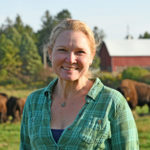 Martha McFarland is the farmland viability coordinator at PFI. In this role, she supports members through farm transition coaching and mediation, helps beginning farmers seeking land and fosters tenant-landowner connections. She has a master’s degree in education from Colorado State University.
Martha McFarland is the farmland viability coordinator at PFI. In this role, she supports members through farm transition coaching and mediation, helps beginning farmers seeking land and fosters tenant-landowner connections. She has a master’s degree in education from Colorado State University.
 Rachel Armstrong, the founder and executive director of Farm Commons, creates the organization’s innovative approach to farm law education and risk reduction. Rachel teaches continuing legal education classes for the American Bar Association and farm law for the University of Massachusetts Amherst. She is also a co-author of “Farmers’ Guide to Business Structures,” published by Sustainable Agriculture Research and Education. Rachel lives in northern Minnesota with her husband and three young children.
Rachel Armstrong, the founder and executive director of Farm Commons, creates the organization’s innovative approach to farm law education and risk reduction. Rachel teaches continuing legal education classes for the American Bar Association and farm law for the University of Massachusetts Amherst. She is also a co-author of “Farmers’ Guide to Business Structures,” published by Sustainable Agriculture Research and Education. Rachel lives in northern Minnesota with her husband and three young children.
Ed Cox has been in private practice representing clients with estate planning, probate, business development and transactions and a variety of agricultural law matters since moving to Centerville, Iowa, in 2014. Prior to private practice, Ed worked at the Drake Agricultural Law Center on land tenure and farm leasing matters, and on beginning farmer and veteran farmer policies and programs. He enjoys serving on a variety of local and state boards and committees and attending local school events.
 Kristine Tidgren is an adjunct assistant professor at Iowa State University and is the director for the Center for Agricultural Law and Taxation. Kristine grew up on a farm in west-central Iowa. Her work focuses on studying and interpreting laws impacting agriculture in Iowa.
Kristine Tidgren is an adjunct assistant professor at Iowa State University and is the director for the Center for Agricultural Law and Taxation. Kristine grew up on a farm in west-central Iowa. Her work focuses on studying and interpreting laws impacting agriculture in Iowa.
 Matt Roberts is the chief planning officer at Syverson Strege. Matt provides peace of mind, joy and clarity about personal and family wealth through comprehensive financial planning strategies. He earned his Bachelor of Science in finance from ISU and a Master of Financial Management degree from Drake University.
Matt Roberts is the chief planning officer at Syverson Strege. Matt provides peace of mind, joy and clarity about personal and family wealth through comprehensive financial planning strategies. He earned his Bachelor of Science in finance from ISU and a Master of Financial Management degree from Drake University.
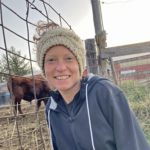 Elana Gingerich grew up on a conventional hog operation but developed a passion for tree crops. Today, she operates Olivia’s Orchard (formerly East Holbrook Chestnut Grove), a 40-acre farm near Parnell, Iowa, with over 10 acres of chestnut trees, a few acres of pawpaw trees and a handful of other fruit and nut trees. Grass-finished beef cattle play a crucial role on the farm: They are rotationally grazed to manage pasture and timber. Elana also operates a nursery supplying chestnut and pawpaw trees for other growers who want to get started in agroforestry.
Elana Gingerich grew up on a conventional hog operation but developed a passion for tree crops. Today, she operates Olivia’s Orchard (formerly East Holbrook Chestnut Grove), a 40-acre farm near Parnell, Iowa, with over 10 acres of chestnut trees, a few acres of pawpaw trees and a handful of other fruit and nut trees. Grass-finished beef cattle play a crucial role on the farm: They are rotationally grazed to manage pasture and timber. Elana also operates a nursery supplying chestnut and pawpaw trees for other growers who want to get started in agroforestry.
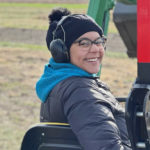 Mari Hunt Wassink owns and operates Black Earth Gardens on a half-acre in Cedar Rapids, Iowa, through Feed Iowa First’s Equitable Land Access Program. Using organic and regenerative practices, she grows vegetables, herbs and fruits that are culturally relevant to the Black and African diaspora communities of eastern Iowa.
Mari Hunt Wassink owns and operates Black Earth Gardens on a half-acre in Cedar Rapids, Iowa, through Feed Iowa First’s Equitable Land Access Program. Using organic and regenerative practices, she grows vegetables, herbs and fruits that are culturally relevant to the Black and African diaspora communities of eastern Iowa.
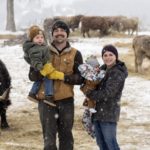 Matt Vermeersch is a first-generation farmer who, with his Jocelyn Vermeersch, is raising Scottish Highland cattle with a targeted sheep and goat grazing business. In early 2024, they moved from their small acreage to oversee the transition of Maggie McQuown’s 170-acre row crop farm into a grazing-focused farm with perennial grasses, prairie and trees.
Matt Vermeersch is a first-generation farmer who, with his Jocelyn Vermeersch, is raising Scottish Highland cattle with a targeted sheep and goat grazing business. In early 2024, they moved from their small acreage to oversee the transition of Maggie McQuown’s 170-acre row crop farm into a grazing-focused farm with perennial grasses, prairie and trees.
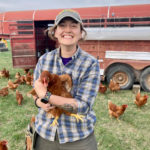 Claire Wilson farms at West Fork Farmstead with her sister, Natasha, and her parents, Brian and Nancy Wilson. Claire is a social worker with an aptitude for mechanical jobs and a passion for all things animals and outdoors. She returned to the farm in 2023 and is learning to care for the animals, assisting Brian with creative farm projects and scheming ways she could live by the farm pond.
Claire Wilson farms at West Fork Farmstead with her sister, Natasha, and her parents, Brian and Nancy Wilson. Claire is a social worker with an aptitude for mechanical jobs and a passion for all things animals and outdoors. She returned to the farm in 2023 and is learning to care for the animals, assisting Brian with creative farm projects and scheming ways she could live by the farm pond.
Short Course 2: Extending the Rotation: Finding an Effective Third Crop
Are you a little bored with only corn and beans? Curious how to work in a bit of something else? This short course will look at several crops for extended rotations, and the feasibility of growing and marketing them in the Midwest. Sessions will explore crop rotations and markets for workhorses like rye, oats and buckwheat; explore ISU research into improved millet varieties for the Midwest; and share the latest on winter camelina production and use as a biofuel. Join farmers and researchers excited to share key production knowledge, new opportunities and their own experience (including mistakes to avoid!).
Short Course Sessions
Session 1: Exploring Millet Research and Its Potential for Midwestern Farmers
Speakers: Srikanth Panthulugiri, Asheesh Singh, Juan Ignacio Di Salvo
Millet is a small, seeded grass grown worldwide as a grain for human or animal consumption. It’s considered a climate-resilient crop as it requires fewer inputs and can withstand variable weather conditions. In this session, we’ll explore millet research with Asheesh Singh and two of his graduate students, Srikanth Panthulugiri and Juan Di Salvo, from Iowa State University and learn why millet might be a viable crop for Iowa and Midwestern farmers.
Session 2: Reliant on Rye: Scaling Up to Deliver On Cover Crop Demand
Speaker: Dean Sponheim
Cereal rye has become a cover crop staple across the Midwest. As more acres are covered each year, demand is growing for cover crop seed. In this session, learn where rye fits in rotations, how to scale up and what to know about this growing market.
Session 3: Making Oats Make Sense
Speakers: Anne and Landon Plagge
Oats were once a crop grown extensively in the Midwest. After a steep decline over the past several decades, they’re now starting to make a comeback. This session will explore how oats fit in farm rotations, where market opportunities exist and why oats might just make sense as a consistent crop to diversify Midwestern farms.
Session 4: Burgeoning Buckwheat: An Unassuming Crop With Numerous Benefits
Speakers: John Wepking
Grown as either a cover crop or a grain crop, buckwheat fills a special place in a farm’s rotation with its short growing season that allows for planting of a subsequent winter cereal crop. Learn from buckwheat advocate John Wepking about the ideal planting time for buckwheat, what crops it should follow in rotation and how his farm has profited from incorporating this modest small-grain crop.
Session 5: Striking Oil: Drilling Down Into Oilseed Opportunities
Speakers: Matt Leavitt and Ben Penner
Winter oilseed crops can be processed into biofuels, lubricants, edible oils, animal feed and more. In the past year, University of Minnesota and Cargill have teamed up to expand the commercial production, breeding and biofuel potential of winter camelina in the Upper Midwest. Hear from agronomist Matt Leavitt about the Forever Green Initiative and research into winter camelina and pennycress for farming systems across the region. Ben Penner will then share his experience growing winter camelina in south-central Minnesota.
Meet the Speakers
Srikanth Panthulugiri is a graduate student in plant breeding at ISU working in Asheesh Singh’s lab. Srikanth’s research focuses on mutation breeding in finger and proso millets to generate genetic variation and select superior mutants suited for Iowa and the Midwest. He is also exploring various emasculation techniques to make crosses in millets.
 Asheesh Singh is a professor of agronomy, and soybean and millets breeder, at ISU. In his research, he works with his research partners and students to develop improved cultivars of millet and soybeans for farmers in the Midwest.
Asheesh Singh is a professor of agronomy, and soybean and millets breeder, at ISU. In his research, he works with his research partners and students to develop improved cultivars of millet and soybeans for farmers in the Midwest.
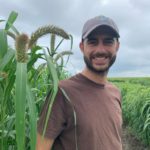 Juan Ignacio Di Salvo is a doctoral graduate student in plant breeding at ISU working in Asheesh Singh’s lab. Juan’s research focuses on characterizing different millet species for adaptation to Midwestern growing conditions. He is also working to develop a standardized phenological scale for different millet species.
Juan Ignacio Di Salvo is a doctoral graduate student in plant breeding at ISU working in Asheesh Singh’s lab. Juan’s research focuses on characterizing different millet species for adaptation to Midwestern growing conditions. He is also working to develop a standardized phenological scale for different millet species.
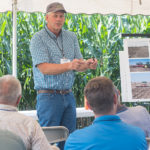 Dean Sponheim is co-owner of Sponheim Sales and Services, which has been offering a “one-stop shop” for cover crop seed and seeding services since 2014. Dean contracts over 1,000 acres of rye and oat production, which he cleans and deploys to airplanes, drills or interseeders.
Dean Sponheim is co-owner of Sponheim Sales and Services, which has been offering a “one-stop shop” for cover crop seed and seeding services since 2014. Dean contracts over 1,000 acres of rye and oat production, which he cleans and deploys to airplanes, drills or interseeders.
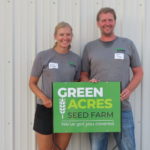 Anne and Landon Plagge operate Plagge Farms Inc. near Latimer, Iowa, and Green Acres Milling in Albert Lea, Minnesota. Together with family, they raise oats, corn, soybeans, livestock and a variety of cover crops. They use cover crops and no-till on all of their acres with a focus on reducing synthetic inputs. The Plagges also run a manure handling operation that involves writing environmental plans, brokering and applying manure as natural fertilizer. Green Acres Milling is focused on bringing sustainable, economically viable third crops to the region.
Anne and Landon Plagge operate Plagge Farms Inc. near Latimer, Iowa, and Green Acres Milling in Albert Lea, Minnesota. Together with family, they raise oats, corn, soybeans, livestock and a variety of cover crops. They use cover crops and no-till on all of their acres with a focus on reducing synthetic inputs. The Plagges also run a manure handling operation that involves writing environmental plans, brokering and applying manure as natural fertilizer. Green Acres Milling is focused on bringing sustainable, economically viable third crops to the region.
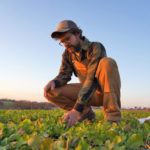 John Wepking co-owns Meadowlark Organics & Meadowlark Community Mill in Ridgeway, Wisconsin. Together with his wife, Halee Wepking, they manage 1,000 acres of diversified field crops and cattle and operate a stone mill sourcing grain from farmers to be processed and distributed regionally. John and Halee work to create direct grain markets, helping farmers maximize profitability and keep their grains within the foodshed.
John Wepking co-owns Meadowlark Organics & Meadowlark Community Mill in Ridgeway, Wisconsin. Together with his wife, Halee Wepking, they manage 1,000 acres of diversified field crops and cattle and operate a stone mill sourcing grain from farmers to be processed and distributed regionally. John and Halee work to create direct grain markets, helping farmers maximize profitability and keep their grains within the foodshed.
 Matt Leavitt is a perennial grains and winter annuals agronomy specialist with the University of Minnesota. As part of the university’s Forever Green Initiative, he studies the production and viability of various perennial and winter annual crops, including winter barley, hybrid rye, winter camelina, Kernza and many others.
Matt Leavitt is a perennial grains and winter annuals agronomy specialist with the University of Minnesota. As part of the university’s Forever Green Initiative, he studies the production and viability of various perennial and winter annual crops, including winter barley, hybrid rye, winter camelina, Kernza and many others.
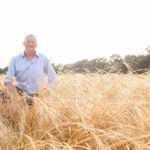 Ben Penner grows organic small grains and continuous living cover crops like Kernza and winter camelina on his farm near Mankato, Minnesota. As consultant for various organizations, he focuses on developing new marketing and sales channels through distribution networks.
Ben Penner grows organic small grains and continuous living cover crops like Kernza and winter camelina on his farm near Mankato, Minnesota. As consultant for various organizations, he focuses on developing new marketing and sales channels through distribution networks.
Short Course 3: Strawberry Production in Iowa
For profitable, easy-to-market crops in Iowa, strawberries are hard to beat. Yet successful strawberry production isn’t always straightforward. From variety selection and market streams to season extension and weed control, the decision points are numerous, and wrong turns can be costly.
Join us to learn how growers around the Midwest achieve profitability with strawberries in a range of systems, and consider how strawberries might fit into your operation.
Short Course Sessions
Session 1: Biology and Production Systems for Strawberries in Iowa
Speaker: Randall Vos
What is the relationship between soil temperature and strawberry size? How much fruit must each strawberry plant produce to achieve profit? What makes Iowa a nontraditional region for growing strawberries? Understanding the biology of strawberries, from blooming triggers and growth habits to moisture requirements and more, is essential for selecting a production system and crop management. In this opening session, join us for a deep dive with commercial fruit crop specialist Randall Vos into the basics of strawberries and the pros and cons of various growing systems.
Session 2: Strawberry Varieties for Iowa
Speakers: Ray and Jen Kruse
As beginning farmers, Ray and Jen found inadequate information about newer strawberry varieties that were replacing older more established varieties available from commercial nurseries. They wanted to understand how new varieties perform in their area to get the best return for their investment. Hear about Ray and Jen’s farming journey, what led them to choose strawberries as a crop, how they designed their trials and what they learned.
Session 3: Filling the Gap With Strawberries
Speakers: Donna and Bill Warhover, Bryan and Anastasiia Etchen
Morning Glory Farm and Iowa Orchard represent very different types of farms, the former focusing on diverse vegetable production and the latter focusing on apples and value-added products, like baked goods. Yet strawberries play an important role in both operations by filling a gap. Strawberries are easy-to-sell, high-value crops that are available during a window of time when both apple orchards and vegetable farms often see a gap in marketable products. Hear perspectives on strawberries from these farmers and the differing ways they manage production.
Session 4: Growing Day-Neutral Strawberries: A Crop That Sells Itself
Speaker: Aaron Wills
Everywhere you look, customers want more locally grown organic fruit. Day-neutral strawberries offer the chance to meet that demand by producing great-tasting strawberries July to September, expanding beyond the typical June strawberry season in the Midwest. At Little Berry Farm near Northfield, Minnesota, farmer Aaron Wills grows day-neutral strawberries using caterpillar tunnels and high tunnels. Aaron will share the system his family uses to grow this new crop and how they market it.
Session 5: Bearing Fruit: A Farmer-to-Farmer Chat
Speakers: Aaron Wills and Kim Andersen
At Blueberry Bottom Farm, farmer Kim Andersen just completed her first season with day-neutral strawberries grown under high tunnels. Aaron Wills has been a mentor and on-call expert for Kim as she navigated getting started with organic, day-neutral strawberries. This session will feature a farmer-to-farmer chat about the wins and lessons of establishing, growing and marketing this additional crop through the first year.
Meet the Speakers
 Randall Vos is the commercial fruit crop specialist for ISU Extension and Outreach. He has a range of experiences in fruit production and other areas of horticulture. His commercial experience includes working at an apple orchard and in the floriculture industry. While in school in Michigan, Randall worked with viticulture and other small-fruit production. Prior to working in extension, Randall taught production horticulture courses and served as the coordinator for the Mid-American Wine Competition.
Randall Vos is the commercial fruit crop specialist for ISU Extension and Outreach. He has a range of experiences in fruit production and other areas of horticulture. His commercial experience includes working at an apple orchard and in the floriculture industry. While in school in Michigan, Randall worked with viticulture and other small-fruit production. Prior to working in extension, Randall taught production horticulture courses and served as the coordinator for the Mid-American Wine Competition.
 Ray and Jen Kruse bought their farm near Colesburg, Iowa, in 2019. Both have a passion for growing plants and are exploring enterprise opportunities to make their farm a viable business as they also raise their young daughter. Ray works for ISU Extension and Outreach in Dubuque County helping clients with technical plant and local food information. Jen works at the Delaware County NRCS office, where she designs soil conservation structures for landowners.
Ray and Jen Kruse bought their farm near Colesburg, Iowa, in 2019. Both have a passion for growing plants and are exploring enterprise opportunities to make their farm a viable business as they also raise their young daughter. Ray works for ISU Extension and Outreach in Dubuque County helping clients with technical plant and local food information. Jen works at the Delaware County NRCS office, where she designs soil conservation structures for landowners.
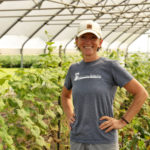 Donna and Bill Warhover started Morning Glory Farm in 2013, growing vegetables and herbs and hosting community and learning events throughout the year. Over their years in operation, they have marketed their produce through a CSA, farmers markets, restaurants, on-farm sales and the food service industry. In recent years, the operation has shifted toward tactics that maintain profitability from the farm while also better accommodating their needs.
Donna and Bill Warhover started Morning Glory Farm in 2013, growing vegetables and herbs and hosting community and learning events throughout the year. Over their years in operation, they have marketed their produce through a CSA, farmers markets, restaurants, on-farm sales and the food service industry. In recent years, the operation has shifted toward tactics that maintain profitability from the farm while also better accommodating their needs.
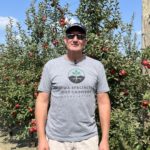 Bryan and Anastasiia Etchen own and operate Iowa Orchard in the Des Moines, Iowa, metro area, including 4 acres of apples in Urbandale and 7 acres of U-pick apples plus 5 acres of U-pick strawberries in Granger. They market their apples at the downtown Des Moines and Valley Junction farmers markets. They have also had a booth at the Iowa State Fair since 2012, donating 5% of their net fair sales to the Iowa Fruit and Vegetable Growers Association, where Bryan serves as a board member.
Bryan and Anastasiia Etchen own and operate Iowa Orchard in the Des Moines, Iowa, metro area, including 4 acres of apples in Urbandale and 7 acres of U-pick apples plus 5 acres of U-pick strawberries in Granger. They market their apples at the downtown Des Moines and Valley Junction farmers markets. They have also had a booth at the Iowa State Fair since 2012, donating 5% of their net fair sales to the Iowa Fruit and Vegetable Growers Association, where Bryan serves as a board member.
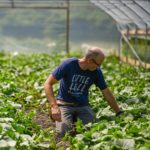 Aaron Wills grew up surrounded by farming, but never thought he’d want to be a farmer. After graduating college, Aaron served in the Peace Corps in Borino, a remote mountain village in Bulgaria, for two years. Today Aaron, along with his partner, Molly McGovern Wills, own and operate Little Hill Berry Farm near Northfield, Minnesota, where they grow organic strawberries, blueberries and raspberries, along with pumpkins and native prairie strips. They sell through farmers markets, online sales and U-pick on the farm, where they greet 200-400 customers each picking day during blueberry season.
Aaron Wills grew up surrounded by farming, but never thought he’d want to be a farmer. After graduating college, Aaron served in the Peace Corps in Borino, a remote mountain village in Bulgaria, for two years. Today Aaron, along with his partner, Molly McGovern Wills, own and operate Little Hill Berry Farm near Northfield, Minnesota, where they grow organic strawberries, blueberries and raspberries, along with pumpkins and native prairie strips. They sell through farmers markets, online sales and U-pick on the farm, where they greet 200-400 customers each picking day during blueberry season.
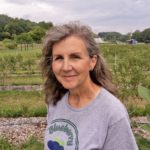 Kim Andersen is an organic farmer at Zihlman Family Farms and Blueberry Bottom, located near Brighton, Iowa. Kim is a long-time educator currently teaching for Southern New Hampshire University. She and her husband, Steve Andersen, grow organic corn, soybeans, oats, hay, blueberries, chestnuts, hazelnuts, pawpaw and persimmon.
Kim Andersen is an organic farmer at Zihlman Family Farms and Blueberry Bottom, located near Brighton, Iowa. Kim is a long-time educator currently teaching for Southern New Hampshire University. She and her husband, Steve Andersen, grow organic corn, soybeans, oats, hay, blueberries, chestnuts, hazelnuts, pawpaw and persimmon.

